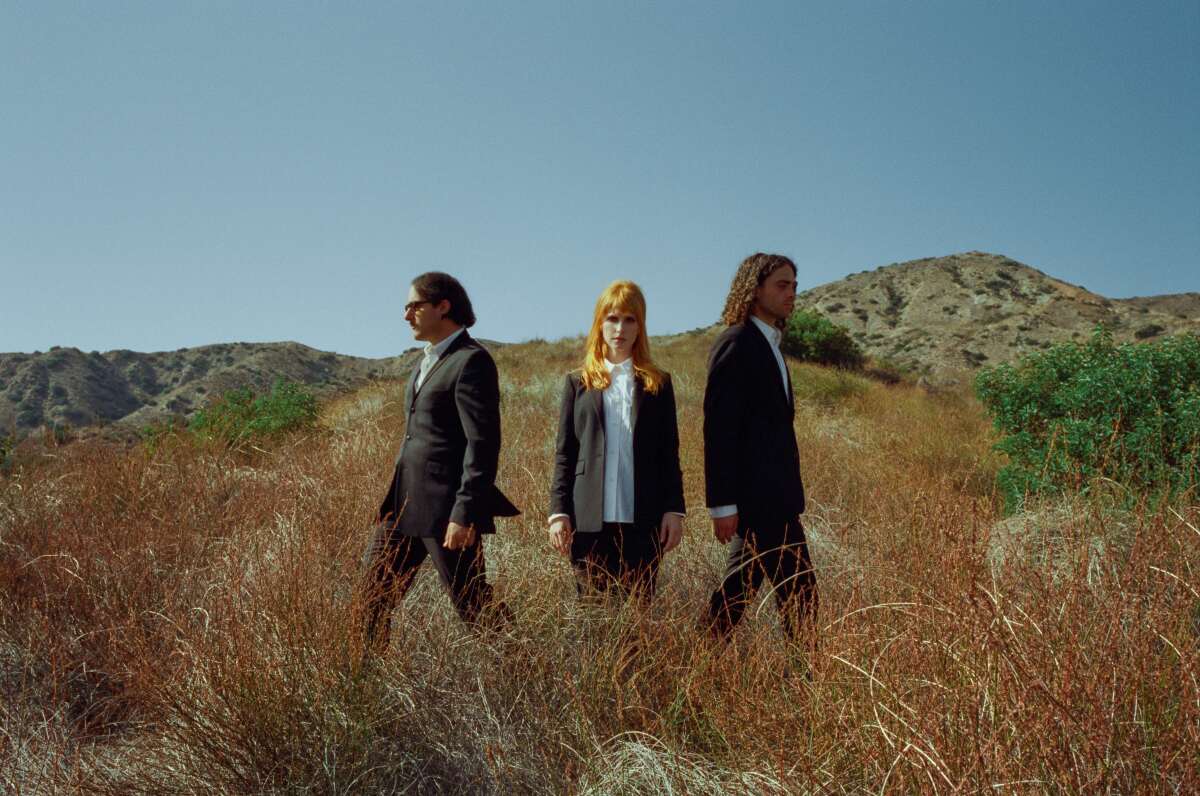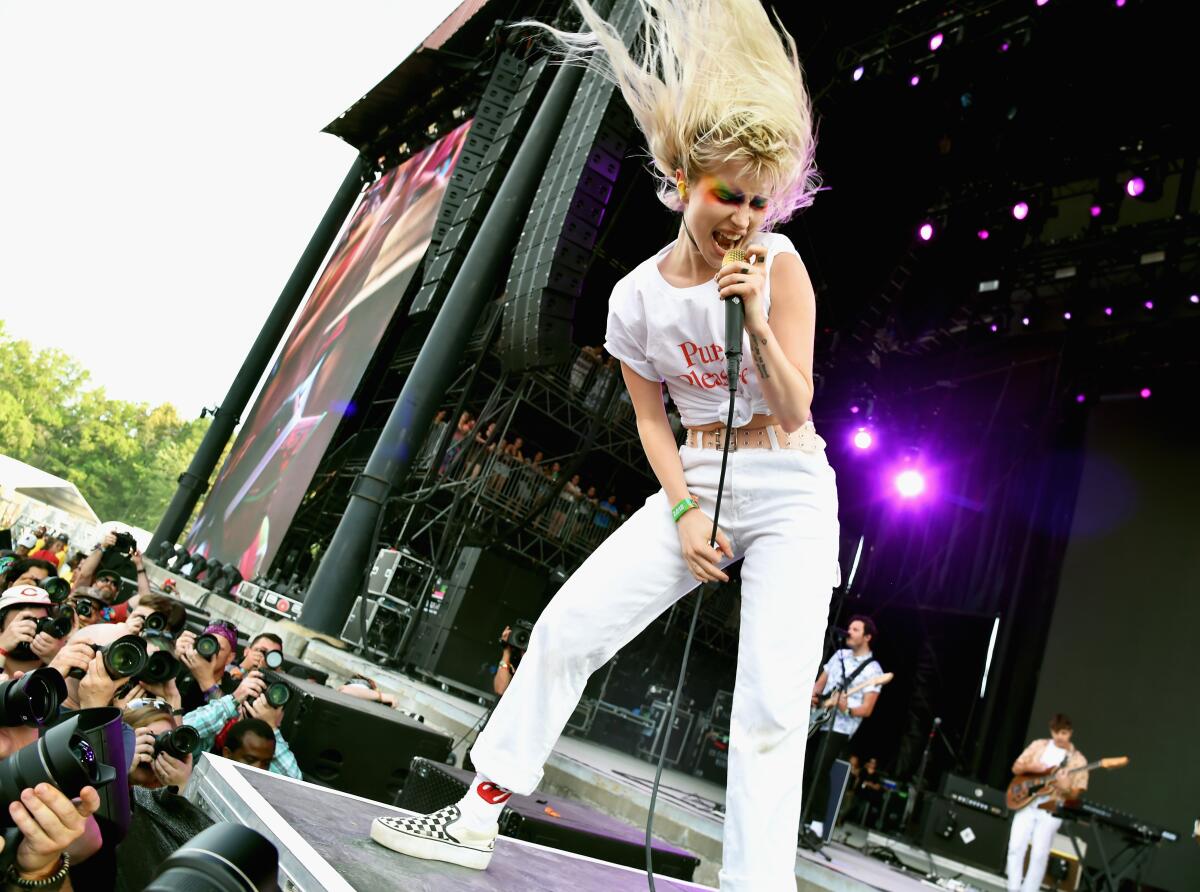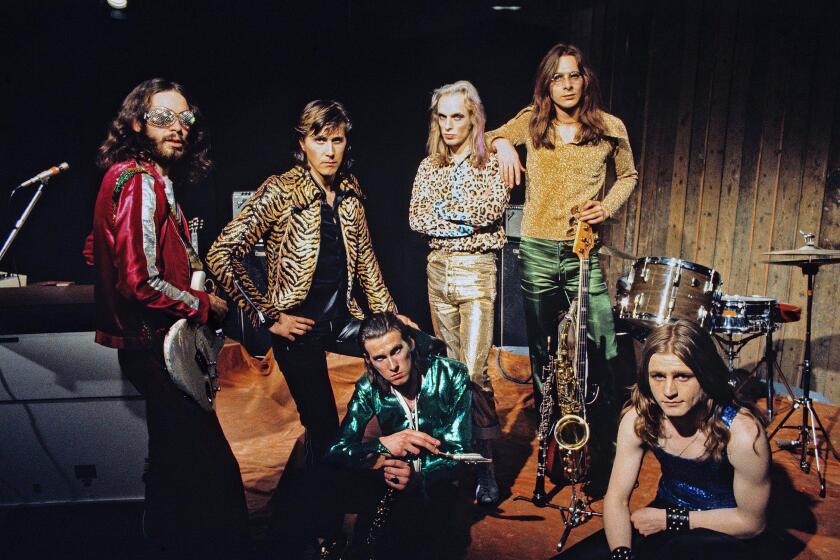As emo nostalgia crests, Paramore returns, with a new sound and a healthy outlook

- Share via
Twenty years ago, if you told Paramore vocalist Hayley Williams that she’d become one of the most influential pop singers in America, she might have offered little more than a scowl. As a DayGlo-haired punk sprite, miraculously gifted with the lung capacity of a Southern church choir, she couldn’t have seen it then — nor could her childhood friends-turned-bandmates, Zac Farro and Taylor York — but Paramore would go on to craft songs that would alter the trajectories of rock and pop.
Artists such as Olivia Rodrigo, Demi Lovato and Willow Smith have all cited Paramore’s music as the blueprint for their own snarling pop-punk confessionals. For her 2021 hit “Good 4 U,” Rodrigo gave Paramore a songwriting credit, citing the verses of their 2008 song “Misery Business,” a scathing missive to Williams’ teen rival.
“What feels most merciful about it is that we didn’t know we were doing anything different back then,” Williams tells The Times inside the band’s North Hollywood studio, her neon locks now a mulled shade of amber. “I use the word ‘merciful’ because we could not have predicted that people would give a s— 20 years later. We were just eating peanut butter and living the dream.”
Behind a wall of Marshall stacks and assorted trunks of gear, Williams, 33, drummer Farro, 32, and guitarist York, 32, nestle into a leather couch. Williams’ charismatic goldendoodle, Alf, holds court in the studio: he tramples over Williams, curls his body around Farro’s neck like an exquisite wriggling scarf, then finally curls himself into a ball next to me. Williams, donning a white hoodie emblazoned with the words “Main Character” in rhinestones, chuckles at her dog’s audaciousness; “I’m so sorry. He’s such a star,” she says.
The art-rock pioneers play the Kia Forum on Wednesday, part of their first U.S. tour in two decades. ‘Time flies when you’re having fun,’ says Bryan Ferry.
The band has officially just wrapped production on its upcoming album “This Is Why,” set for release on Feb. 10. The lead single of the same name — and the band’s first new offering since the 2017 album “After Laughter” — is a funky tapestry frilled with tambourines and angular dashes of guitar. Paired with a crisp “Mod Squad”-evoking video, directed by Turnstile frontman Brendan Yates, “This Is Why” weaves in tendrils of rock ‘n’ roll’s past but lodges the band firmly back into the foreground of pop’s present.
The band first teased “This Is Why” in September, with a photo of the players’ faces smushed against glass. It called to mind the stifling social restrictions brought on by COVID-19, and the residual hostility between people. “This is why I don’t leave the house,” Williams sings bitingly on the new track, “You say the coast is clear / but you won’t catch me out!”
“How sad it is that we’ve gone through this horrible thing globally, as humans,” says Williams. “Whether it’s racism, or conspiracy theories … I think about how the internet is supposed to be this great connector, but drives us further inward and further apart. I’ve watched people be so awful to each other. How could we go through these things together and come out worse?”

Ironically, Paramore is gearing up to greet more people than they have in the last four years combined — this fall, they will hit the road for the first time since 2018. Kicking off on Oct. 2 in Bakersfield, the tour includes shows in L.A. on Oct. 20 and 27, and three nights at the sold-out pop-punk and emo festival When We Were Young, scheduled for Las Vegas on Oct. 22, 23 and 29.
Paramore will co-headline the fest with another essential emo group, My Chemical Romance. Yet there’s a catch: They may have to perform at the same time on opposite stages.
“They want war!” jests Williams, a longtime MCR fan. “We did not think there was going to be the kind of demand there is. We’re careful about how we engage with nostalgia; five years ago we would have said ‘absolutely not’ to this. But I think it’s significant that we feel confident enough to maintain the journey that we’ve been on and celebrate with these fans.”
Some of the fanfare hasn’t computed for Williams, who came to fame during a vastly different time for women in rock music. Paramore used to be relegated to smaller, designated female stages at festivals, such as the Shiragirl stage at the Vans Warped Tour. While still a minor, Williams was written off as sexual fodder by punk gatekeepers; and by her own admission, “Misery Business,” which viciously dressed down another girl, has aged poorly since the 2000s. Williams retired the song from the band’s repertoire in 2018, citing sexist lyrics like “Once a whore, you’re nothing more,” but the song briefly resurfaced at April’s Coachella festival, where Williams performed a course-corrected version with pop superstar Billie Eilish.
“It wasn’t cool to be feminine back then,” Williams explains. “I put a damper on that for my own confidence, because it was hard to go into a male-dominated space — not even as a woman, but as a little girl.”
“I think that’s why a feminine perspective is really important in this day and age of music,” offers Farro.

For the record:
1:52 p.m. Sept. 28, 2022Producer Richard Williams was incorrectly identified as a manager in an earlier version of this article.
Williams’ dreams of rock stardom were realized early in life. After her parents divorced in 2002, Williams and her mother relocated from their hometown of Meridian, Miss. to Franklin, Tenn., a 30-minute drive south of Nashville. A prodigious singer-songwriter new to the Music City circuit, Williams was discovered by manager Dave Steunebrink and producer Richard Williams; she then signed a deal with Atlantic Records in 2004, when she was 15 years old.
The label primed Williams to be a solo act, in the same vein as pop-rock virtuosas Kelly Clarkson and Avril Lavigne. Yet Williams, already promised to punk, insisted on sticking with her band of friends: bassist Jeremy Davis, guitarist Josh Farro and his kid brother Zac. (York opted to graduate from high school before joining the band as rhythm guitarist in 2007.)
What’s clear about the country musician, who touched down Saturday night at Crypto.com Arena for the first of two sold-out concerts, is that being caught on video drunkenly using the N-word has not derailed his career.
While Williams retained her solo deal with Atlantic, the label decided to release Paramore’s thunderous 2005 debut, “All We Know Is Falling,” via the Florida label Fueled by Ramen: a launchpad for pop-faring emo bands like Jimmy Eat World, Fall Out Boy and Panic! at the Disco. With the release of Paramore’s 2008 breakthrough LP “Riot!,” the band rose up the ranks of the Top 40, continuing with 2008’s “Decode,” their moody cut from the “Twilight” soundtrack.
However, the separate record deal with Williams, as well as differences in faith and lifestyle, sparked discord between bandmates. After releasing their 2009 album, “Brand New Eyes,” the Farro brothers departed in 2010, stating wishes to be closer to family. Davis worked intermittently between the years of 2005 and 2015; after his resignation, he filed a lawsuit claiming credit for songs on their 2013 self-titled record. (It was settled in 2017.)

The group’s remaining members, Williams and York, won the Grammy for best rock song in 2013 for Paramore’s guitar-gospel hit, “Ain’t It Fun.” Yet the two found it difficult to celebrate; Williams began floundering in the throes of what she’s come to understand as depression and PTSD, while York says he developed symptoms of acute anxiety. “I was struggling with agoraphobia before the pandemic,” he says, with a hint of levity.
In 2016, Williams married her partner of nine years, Chad Gilbert, lead guitarist in New Found Glory. The marriage ended the following year in divorce, due to what Williams has described as issues with his infidelity. She began a course of therapy thereafter.
“In retrospect, I can see clearly that I was looking for a family unit that I didn’t have,” says Williams. “I was angry about that for a long time.”
During this period, Williams exchanged messages with Zac, who had started his own projects, Novel American and HalfNoise, and relocated to New Zealand for two years. Zac returned to Nashville to record drums on the band’s 2017 album, “After Laughter” — a 12-track dance-off with depression that conjured the world-music infatuations of new wave groups like Talking Heads.
“Somehow we metabolize all these styles that we loved growing up, or that we randomly discovered, and it still sounds like us,” says Williams.

The band further indulges their sonic curiosities on “This Is Why,” which is accentuated by syncopated rhythms and jagged guitar rock riffs. The band absorbed the sounds of U.K. acts like Radiohead and Bloc Party, says their L.A.-based producer Carlos de la Garza; the Red Hot Chili Peppers’ 1985 funk-punk LP, “Freaky Styley,” also played a pertinent role during the recording process.
“You just have a new animal,” he says of the trio.
“It’s only lately that my outside and my inside world are kind of congruent, where I feel safe,” says Williams, motioning at Farro and York. “I think as more LGBTQ people [enter mainstream] conversations, people are now familiar with their term ‘chosen family.’ This band kept me out of a lot of trouble. It gave me a place to belong and identify with.”
Paramore’s live shows have served a similar purpose for its diverse fanbase. Prior to the pandemic, Paramore shows culminated in Williams picking a fan from the crowd to hoist onstage and sing along with the band.
On social media, people share videos of Black and brown Paramore fans — long marginalized in emo and the music industry surrounding it — shaking and crying with glee as they sing their favorite Paramore songs opposite Williams.
“I feel a very ferocious passion and want to protect people that don’t look like me,” says Williams, who used her Instagram page to platform anti-racist activists during the George Floyd protests in the summer of 2020.
“Not that there’s any comparison, but there’s something that we learned from not knowing where to fit in growing up,” adds Farro.
“We benefit from the joy of people feeling free and welcome at our shows,” says Williams. “I want people to see different fans onstage. If everyone had the same opportunities, I think we’d be surprised [to see] who would step up when given the chance.
“It is our responsibility to uplift new artists and young people,” says Williams, who has amplified indie artists like Phoebe Bridgers, Nova Twins and Pom Pom Squad on her podcast for BBC Sounds, “Everything Is Emo.”
“I’m stoked it’s turning around, that there’s more people of color in the scene, and so many rad new bands that are teaching bands like us,” says Williams. “We have to continue to make it easier and more hopeful and more equitable as a scene.”
More to Read
The biggest entertainment stories
Get our big stories about Hollywood, film, television, music, arts, culture and more right in your inbox as soon as they publish.
You may occasionally receive promotional content from the Los Angeles Times.












